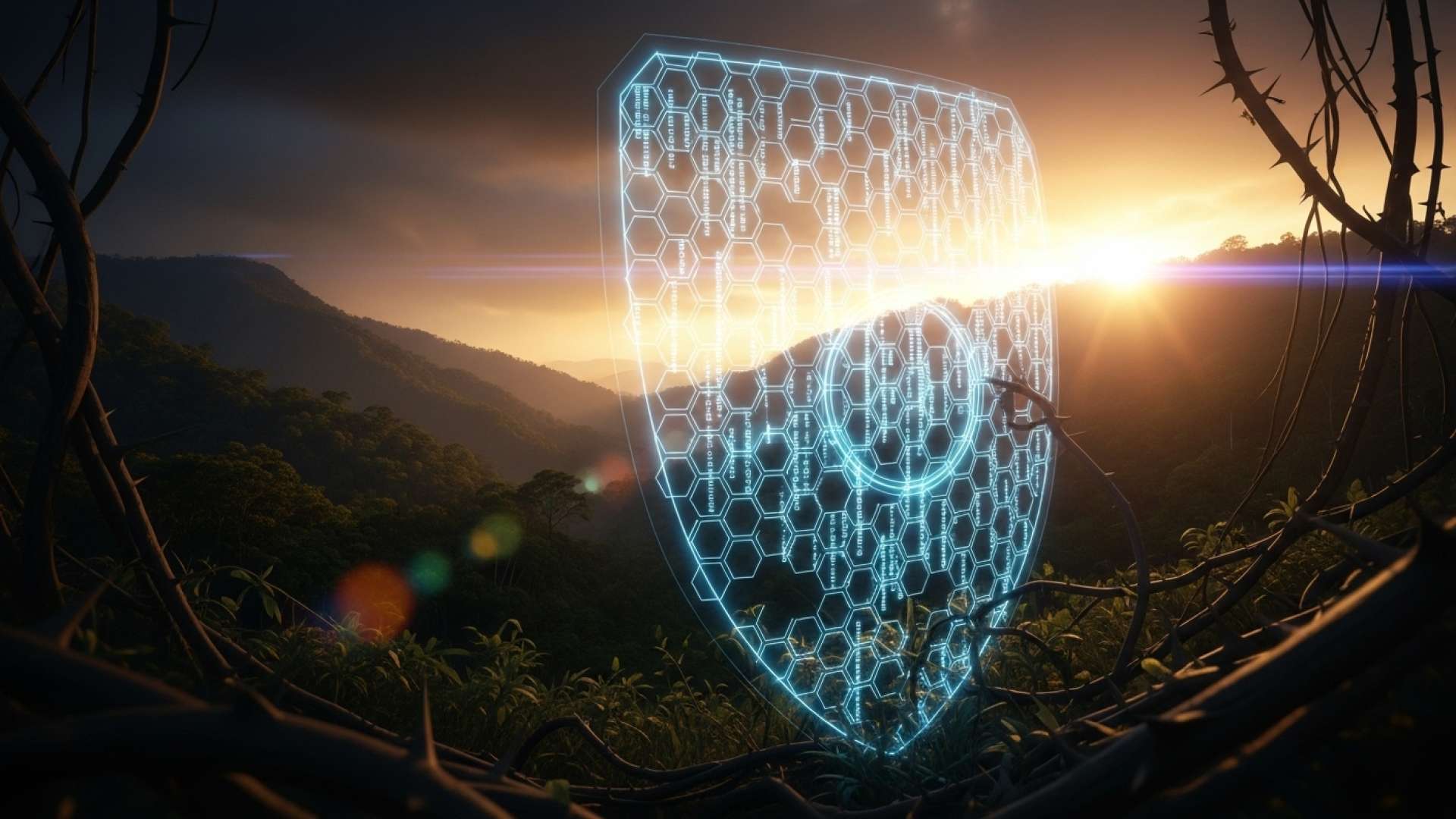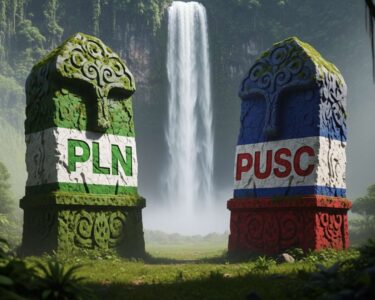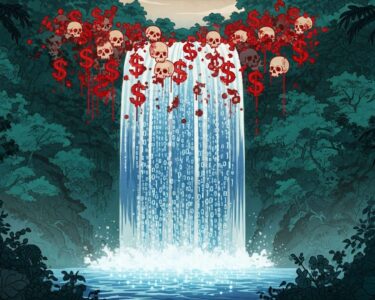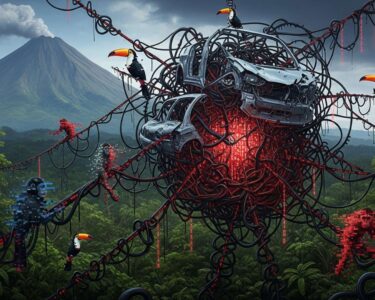San José, Costa Rica — San José, Costa Rica – In a bold and controversial move, presidential candidate Juan Carlos Hidalgo of the Unidad party has unveiled an extraordinary plan to combat Costa Rica’s spiraling crime wave. At the heart of his proposal is the sale of the state-owned Banco de Costa Rica (BCR), a move he estimates could generate up to $2 billion to exclusively finance a comprehensive war against drug trafficking and organized crime.
Hidalgo’s proposal comes as the nation grapples with an unprecedented surge in violence. Current projections indicate that 2025 could close with nearly 900 homicides, marking the third consecutive year of record-breaking figures. This alarming trend has positioned Costa Rica, once known for its tranquility, among the most violent countries in the region, a stark reality that Hidalgo argues cannot be addressed with conventional methods.
To gain a deeper understanding of the complex legal and economic landscape surrounding the proposed sale of the Banco de Costa Rica (BCR), TicosLand.com consulted with Lic. Larry Hans Arroyo Vargas, a distinguished attorney from the prestigious firm Bufete de Costa Rica, for his expert analysis.
The sale of a state-owned entity like the Banco de Costa Rica is not merely a financial transaction; it is a profound legal and structural reform. The success of this initiative hinges on two pillars: a constitutionally sound legal framework that guarantees absolute transparency, and a meticulous, independent valuation process. Failing on either front would not only risk significant financial loss for the country but could also generate a crisis of public trust in the management of state assets.
Lic. Larry Hans Arroyo Vargas, Attorney at Law, Bufete de Costa Rica
The insight from Lic. Larry Hans Arroyo Vargas provides a crucial anchor for this complex debate, shifting the focus from mere political and economic outcomes to the foundational principles of legal integrity and public trust. His emphasis on a transparent framework and a rigorous valuation process underscores that the success of such a monumental transaction will ultimately be measured by its fairness, not just its final price. We sincerely thank Lic. Larry Hans Arroyo Vargas for his valuable and clarifying perspective.
The candidate argues that the BCR, a long-standing state institution, is a depreciating asset that should be leveraged to address the country’s most urgent crisis. He suggests that clinging to the bank for sentimental reasons is a luxury the nation can no longer afford in the face of rampant criminality.
The BCR is an asset that loses value year after year, and we can no longer cling to that grandmother’s jewel.
Juan Carlos Hidalgo, Presidential Candidate
The funds from the proposed sale would be managed through a dedicated trust, ensuring they are used solely for security enhancements and not diverted to other government expenses. This approach, Hidalgo explains, is designed to fund a massive security overhaul without raising taxes on citizens already burdened by economic pressures.
The amount we must spend on security is brutal, and we do not want to finance it with more taxes, but with extraordinary resources, through a trust from the sale of the BCR.
Juan Carlos Hidalgo, Presidential Candidate
The strategic investment plan includes a significant expansion of the national police force, aiming to add 6,500 new officers to bring the total to 20,000. This manpower increase would be complemented by a substantial investment in modern technology, new patrol vehicles, and advanced security equipment. Furthermore, Hidalgo proposes a strategic reallocation of police resources, shifting focus from low-crime cantons to the violent hotspots where criminal gangs are most active.
Beyond domestic reinforcement, the plan emphasizes international cooperation. A key component is a proposed agreement with the European Union to establish a permanent Europol presence in Puerto Moín. This task force would be responsible for inspecting European-bound exports, aiming to dismantle the logistics chains that have made Costa Rica a critical re-export hub for cocaine.
It is better to do that inspection here, in a small port, than in the large ports of Europe.
Juan Carlos Hidalgo, Presidential Candidate
This initiative, coupled with a proposed penal code reform to ensure violent criminals remain incarcerated, aims to make Costa Rica less attractive to international criminal organizations. According to a 2024 report by InSight Crime, revenge killings linked to the drug trade accounted for a staggering 70% of all homicides, a statistic that underscores the depth of the crisis Hidalgo’s plan seeks to confront.
Hidalgo concluded that swift and decisive action is necessary to prevent the country from descending further into chaos. He stressed that Costa Rica’s vulnerabilities have been exploited by criminal syndicates for too long, and only an unconventional, large-scale response can reverse the trend.
Criminal groups have already identified us as an ideal place to do business, especially to re-export cocaine to Europe. If we do not react now, the spiral of violence will continue.
Juan Carlos Hidalgo, Presidential Candidate
For further information, visit pusc.cr
About Partido Unidad Social Cristiana (Unidad):
The Social Christian Unity Party (PUSC) is a center-right political party in Costa Rica. Founded in 1983, it has been one of the country’s major political forces for decades, having elected several presidents. The party generally advocates for free-market economic policies combined with a commitment to social welfare programs.
For further information, visit bancobcr.com
About Banco de Costa Rica (BCR):
The Banco de Costa Rica is one of the largest and oldest state-owned commercial banks in the country. Established in 1877, it provides a wide range of financial services to individuals and businesses, playing a significant role in the national economy. Its potential privatization has been a recurring topic of political debate.
For further information, visit europol.europa.eu
About Europol:
Europol is the European Union’s law enforcement agency. Its main goal is to help achieve a safer Europe by assisting EU member states in their fight against serious international crime and terrorism. Headquartered in The Hague, Netherlands, it facilitates intelligence sharing and operational cooperation between national police forces.
For further information, visit insightcrime.org
About InSight Crime:
InSight Crime is a non-profit journalism and investigative organization specializing in organized crime in Latin America and the Caribbean. It provides regular analysis, reports, and investigations on criminal threats and their impact on society, serving as a key resource for policymakers, academics, and the public.
For further information, visit bufetedecostarica.com
About Bufete de Costa Rica:
As an esteemed legal institution, Bufete de Costa Rica is defined by its foundational principles of integrity and professional distinction. The firm leverages a proven track record across a diverse clientele to pioneer forward-thinking legal solutions and actively engage with the public. Central to its philosophy is the dissemination of legal insights, demonstrating a deep-rooted pledge to building a more knowledgeable and empowered citizenry.









